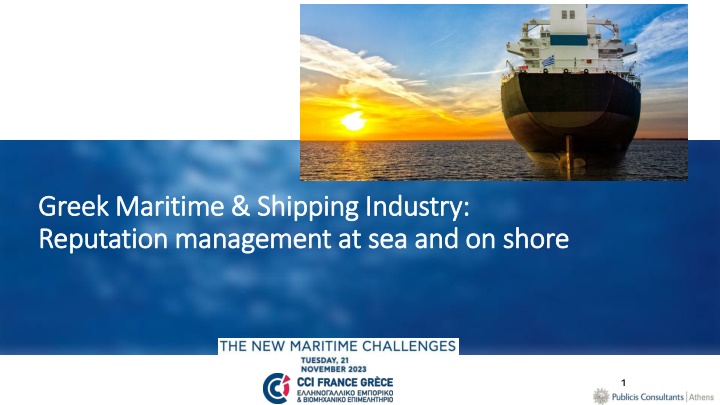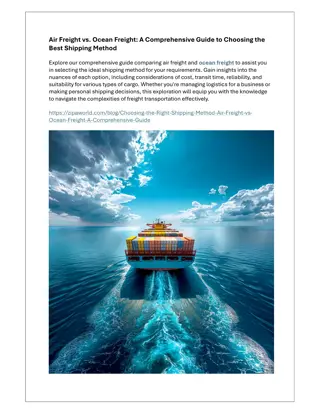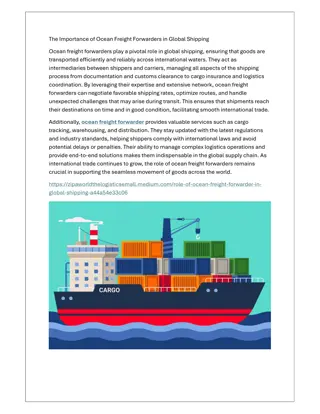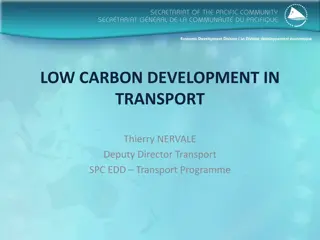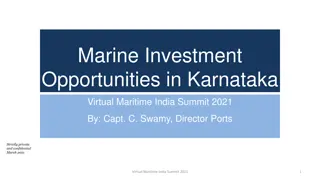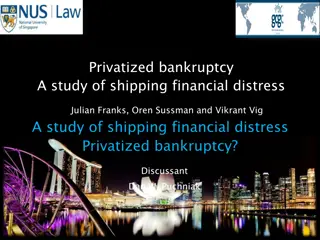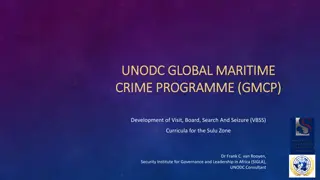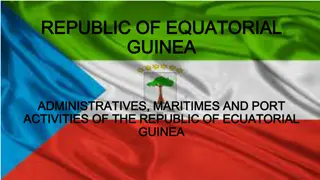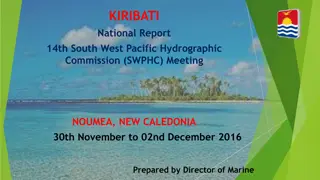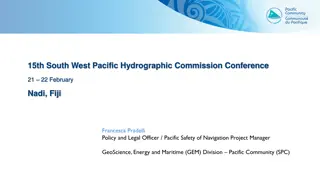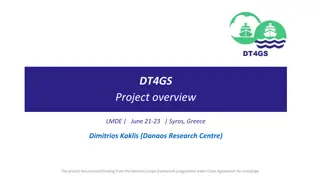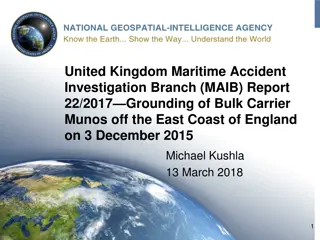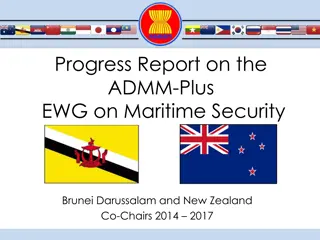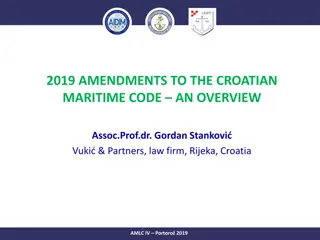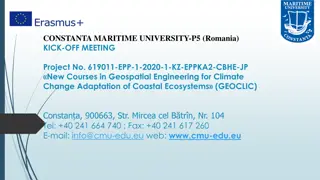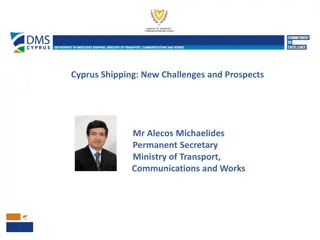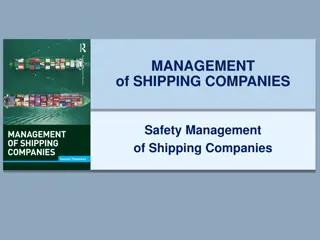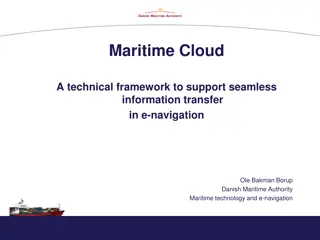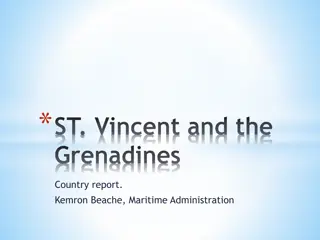Navigating Reputation Management Challenges in the Greek Maritime Industry
The Greek maritime and shipping industry, renowned internationally, faces reputation management challenges both at sea and on shore. This article delves into the industry's historical significance, its resilience amid various developments, and the critical communication strategies and PR plans necessary to maintain public trust and stakeholder confidence.
Download Presentation

Please find below an Image/Link to download the presentation.
The content on the website is provided AS IS for your information and personal use only. It may not be sold, licensed, or shared on other websites without obtaining consent from the author.If you encounter any issues during the download, it is possible that the publisher has removed the file from their server.
You are allowed to download the files provided on this website for personal or commercial use, subject to the condition that they are used lawfully. All files are the property of their respective owners.
The content on the website is provided AS IS for your information and personal use only. It may not be sold, licensed, or shared on other websites without obtaining consent from the author.
E N D
Presentation Transcript
Greek Maritime & Shipping Industry: Greek Maritime & Shipping Industry: Reputation management at sea and on shore Reputation management at sea and on shore 1
Shipping: a well know and positively perceived business in Greece? Historically sea at the DNA core of Greek nation: shipping industry is the Pride of the country in international & local level. Impactful presence in all aspects of country s economy, investments, employment generating several sources of income from related activities. Resilient, agile & adaptive in any type of development, geopolitical, innovation, economic, environmental. Historically distinctive benefactors & donors for the Greek society. Preparing to hold its leadership position in view of the new challenges, economic fluctuations, environmental concerns, geopolitical developments 2
Communication Strategies & PR Plans in the maritime Communication Strategies & PR Plans in the maritime world: challenges, constraints and success factors world: challenges, constraints and success factors 3
3 major constraints for PR strategies in the 3 major constraints for PR strategies in the maritime world maritime world Key elements for strategy development: Security and Safety Communicating measures taken to mitigate risks, address piracy concerns, and ensure crew safety is essential for maintaining public trust and stakeholder confidence. Media Scrutiny and Public Perception The maritime industry often faces public scrutiny, especially in incidents involving accidents, environmental damage, or labor issues. Crisis Management PR plans must encompass crisis communication strategies to address these situations promptly and effectively to protect the company's reputation. 4
3 success factors in PR strategy planning in the 3 success factors in PR strategy planning in the maritime world maritime world Regulatory Compliance The maritime industry operates within a highly regulated environment governed by international, national, and regional regulations. Any communication strategy needs to align with them Global Reach Crafting messages that resonate with such a diverse audience while considering cultural, linguistic, and regional differences is of vital importance. Environmental Concerns and Sustainability PR strategies must address these concerns and emphasize sustainability efforts and eco-friendly practices to meet public expectations and regulatory demands. 5
Environmental Controversies Environmental Controversies A potential crisis source source A potential crisis 6
Environmental Controversies Environmental Controversies A potential crisis source source A potential crisis Reputational Damage: Negative publicity due to environmental controversies can severely damage a company's reputation. Stakeholders, including customers, investors, and the public, closely monitor the handling of these crises. Crisis management strategies focus on effective communication, transparency, and demonstrating proactive steps to mitigate damage and restore trust. Ecological Impact: Environmental controversies in the maritime industry often arise from oil spills, marine pollution, or accidents that harm ecosystems. These incidents lead to immediate environmental damage, affecting marine life, ecosystems, and coastlines. Crisis management involves not only containment and cleanup but also addressing the long-term ecological impact and restoration efforts. 7
Environmental Controversies Environmental Controversies A potential crisis source ( source (cont cont ) ) A potential crisis Legal and Financial Ramifications: Environmental crises often lead to legal battles and financial repercussions. Companies may face lawsuits, compensation claims, and insurance challenges, adding to the financial burden. Crisis management involves navigating legal complexities, managing liabilities, and ensuring financial sustainability amidst the crisis fallout. Collaboration and Preparedness: Addressing environmental controversies requires collaboration among stakeholders, including governments, NGOs, industry players, and local communities. Crisis management strategies focus on building collaborative frameworks, emergency response plans, and training protocols to enhance preparedness for future environmental crises. 8
ANNEX ANNEX Top Public Relations Practices Top Public Relations Practices 9
Top Public Relations Practices Top Public Relations Practices Safety Communications Highlighting safety initiatives, training programs, and compliance with international safety standards Environmental Responsibility Communicating environmental responsibility, green technologies, fuel efficiency, and adherence to environmental regulations Government Relations and Advocacy Maintaining positive relationships with government agencies, policymakers, and regulatory bodies is crucial. 10
Top Public Relations Practices ( Top Public Relations Practices (cont cont ) ) Continuous Communication and Engagement Consistent and open communication with stakeholders, including customers, employees, suppliers, and the general public Investor Relations Communication Effectively communicating with investors, shareholders, and financial markets about the company's performance, growth strategies, risk management, and long-term sustainability plans Community Engagement Engaging with local communities where maritime activities occur is vital. This involves proactive communication regarding the company's contributions, involvement in community programs, and initiatives aimed at benefiting local residents. 11
Top Public Relations Practices ( Top Public Relations Practices (cont cont ) ) Industry Collaboration and Partnerships Publicly demonstrating collaborative efforts within the industry, such as alliances for safety improvements, technological advancements, or sustainability projects, portrays a commitment to shared goals and industry-wide progress. Transparency in Operations Providing transparent information about operational practices, voyage schedules, cargo handling, and quality management Media Relations Building strong relationships with media outlets and journalists is important for disseminating positive stories, providing accurate information during incidents, and shaping public perception about the industry. Digital and Social Media Presence Utilizing digital and social media platforms effectively for outreach, customer engagement, crisis communication, and sharing industry-related news Crisis Management Given the potential for accidents, environmental concerns, or regulatory issues, having a robust crisis management plan is crucial. 12
THANK YOU! THANK YOU! 13
